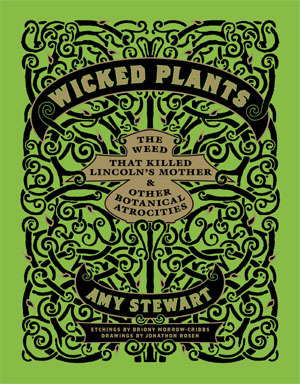
Just when we thought it was safe to go into our gardens, writer and gardener Amy Stewart has decided to shake us up a little with her sly compendium of wicked plants. The full title of Amy’s newest book is Wicked Plants: the weed that killed Lincoln’s mother and other botanical atrociities.
A plant killed Lincoln’s mother? Lincoln’s mother Nancy Hanks Lincoln died at the age of 34, leaving her 9 year old son Abe behind. Her illness, known as milk sickness, was a common scurge of the time in agricultural areas. Little was known about the illness, until a woman doctor named Anna Bixby realized it was caused by a weed called White Snakeroot, which when ingested by cows, would turn milk toxic for all who drank it.
Recorded history is full of stories about politicians, soldiers, evil wives, and greedy husbands who used poisons derived from plants to murder their rivals. Wicked Plants reads like an extensive encyclopedia of expedient ways to eliminate enemies, whether with the seeds of the castor bean, the berries of deadly nightshade, the leaves of Oleander, the stems of the death cap mushroom, or the sap of poison hemlock. .
But this book also investigates less deadly plants that can still make our lives miserable. Under catagories such as “dangerous”, “illegal”, “painful” or “offensive” we find plants wrecking havoc far and wide, including grapple plant or devil’s claw found in South Africa; Whistling Thorn acacia from East Africa, and the Stinging Tree from Australia, plants that all leave painful reminders of even the briefest encounters. Closer to home ,we need to beware of the sago palm, Jimson Weed, and stinging nettle. Plants as ubiquitous as Yew can be dangerous around youngsters tempted to eat their pretty red berries. Invasive plants like water hyacinth and kudzu can cause millions of dollars in property damage and habitat destruction each year.
With all these tales of death and destruction, you might think Wicked Plants a pretty grim choice for the average reader. Yet Amy’s trademark humor keeps just the right mixture of seriousness and wit in this unique and unusual investigation of the wicked plants found in our back yards and in the most remote corners of the world. Surely the world would be a sadder place without plants, wicked or not!




